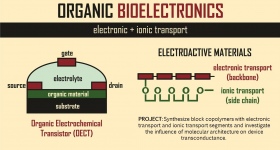Andreea-Otilia Suiu and Thomas Hodsden win PE-CDT Prizes for MRes Research

Congratulations to Andreea-Otilia Suiu on winning the Plastic Electronics CDT Project Prize, and to Thomas Hodsden on winning the Director's Prize!
Andreea and Thomas are both in Cohort 7 of the Plastic Electronics CDT programme. They have just completed their MRes and started on their PhD research. Here they tells us about their research and the benefits of being part of the CDT.
Andreea
I am supervised by Professor Iain McCulloch (Imperial College London/KAUST) and Dr Sheena Zuberi (Cambridge Display Technology) and work in the area of Organic Bioelectronics. This couples the fields of organic electronics and biology, ultimately aiming to develop novel biomedical applications. Even though organics have a series of useful advantages such as ease of synthesis and functionalisation tailored for specific applications and excellent interfacing with biological tissue, their use in bioelectronics devices has scarcely been explored so far. For the organic electrochemical transistor (OECT), one of the most relevant devices to organic bioelectronics which transduces ionic fluxes into electronic outputs, the current selection of active channel materials is virtually limited to PEDOT:PSS and its derivatives. This brings up a pressing need for the rational design of novel materials with improved properties paving the way to new applications. My project, titled “A Fundamental Study of the Influence of Molecular Structure on Ion Penetration and Capacitance in Organic Electrochemical Transistors”, aims to establish a link between molecular architecture and OECT performance through the synthesis of a series of block copolymers based on varying lengths of poly-3-hexylthiophene and polyethylene glycol units.
 I have thoroughly enjoyed being part of the CPE Cohort 7 this year – it has probably been the most pleasant and constructive year spent in London so far. The course components have been truly useful to me in terms of understanding aspects of Plastic Electronics that my Chemistry background did not cover, and made me grasp the interdisciplinary nature of the field. I appreciate and would like to thank for the support of the CPE staff, my research group and Cambridge Display Technology – any question I had, there would always be someone to talk to. My colleagues from Cohort 7 are wonderful people whom I am very happy to have met and spent time with, both in terms of work and outside our academic commitments.
I have thoroughly enjoyed being part of the CPE Cohort 7 this year – it has probably been the most pleasant and constructive year spent in London so far. The course components have been truly useful to me in terms of understanding aspects of Plastic Electronics that my Chemistry background did not cover, and made me grasp the interdisciplinary nature of the field. I appreciate and would like to thank for the support of the CPE staff, my research group and Cambridge Display Technology – any question I had, there would always be someone to talk to. My colleagues from Cohort 7 are wonderful people whom I am very happy to have met and spent time with, both in terms of work and outside our academic commitments.
Thomas
I’m an organic chemist working in Prof Martin Heeney’s Group. My MRes project was based around the highly pi-extended, conjugated monomer indacenodithienothiophene (IDTT), which as part of a donor-acceptor type copolymer has been recently shown to exhibit very high hole mobility in organic field-effect transistors (OFETs). In particular, my project focused on investigating an improved synthetic route to IDTT, in addition to a preliminary study into the effect of molecular weight on the OFET performance using the copolymer as the active semiconductor layer.
Being part of the PE-CDT has been very rewarding. It allows you to meet and interact with a range of people from differing scientific backgrounds, which helps collaborations as well as giving you a better idea of the wider research going on in plastic electronics and putting your own research in context. Completing the MRes course first gives you exposure and grounding in all areas of plastic electronics, which allows a better appreciation of the area, which you’d be unlikely to get if you were focused solely within a research group from the start. I’m very glad to receive the Directors Prize and am now ready to progress on thorugh the PhD.
Article text (excluding photos or graphics) © Imperial College London.
Photos and graphics subject to third party copyright used with permission or © Imperial College London.
Reporter
Dr Steph Pendlebury
Faculty of Engineering
Andreea-Otilia Suiu
Department of Chemistry
Thomas Hodsden
Department of Chemistry